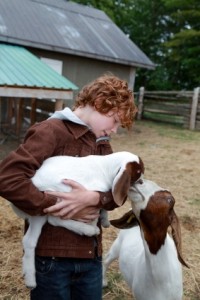 On our vacation to the East Coast last summer, I spent time with my childhood friend, Virginia, and her 4 kids. Her oldest child, Micah, had just turned 15 when I saw him. I don’t usually expect 15 year-old boys to be great conversationalists. And for the most part Micah was succinct, though polite when talking about his life. Until I asked about the animals he’s raising, 40 chickens and 4 goats. When talking about his farm animals Micah’s eyes lit up and his speech became animated. He seemingly could have gone on forever about buying his goats “at auction” and his quickly expanding chicken business.
On our vacation to the East Coast last summer, I spent time with my childhood friend, Virginia, and her 4 kids. Her oldest child, Micah, had just turned 15 when I saw him. I don’t usually expect 15 year-old boys to be great conversationalists. And for the most part Micah was succinct, though polite when talking about his life. Until I asked about the animals he’s raising, 40 chickens and 4 goats. When talking about his farm animals Micah’s eyes lit up and his speech became animated. He seemingly could have gone on forever about buying his goats “at auction” and his quickly expanding chicken business.
When Micah was 10, his family had moved to the country from the suburbs. Although Micah doesn’t live on a farm, many small farms surround his neighborhood. Soon after moving, Micah met a neighbor who owned a brood of hens and was hooked.
Virginia reminded me that she and her husband had little experience with or interest in farm animals. She admitted that they’d put off Micah’s request to raise chickens for a year or so. But like many of life’s real passions, Micah’s didn’t ebb over time. Eventually his parents relented and soon they were sharing their bathroom with 12 fluffy chicks for the winter.
Over time Micah built his flock up to 40 chickens. He also amassed a group of regular egg customers, learning about finance along the way. Once he’d saved some money he began floating the idea of adding goats to his farm operation. Soon after Micah bought the goats, his grandparents asked what he wanted for his birthday. Micah informed them that he needed a shed. How great is that? Not an iPad or an iPhone, but a shed for his animal supplies.
Encouraging Innovation
Although Virginia said it hasn’t always been easy for her, she and her husband have done for Micah what Tony Wagner advises in his book, Creating Innovators: The Making of Young People Who Will Change the World. As parents they have supported Micah’s passion. After interviewing over 200 experts on innovation, Wagner concludes that it is not important what college major or serious interest a young person chooses, only that they follow something about which they are passionate and then delve deeply into their field.
For parents like Virginia who may find themselves explaining their child’s unusual pursuit to surprised extended family members more than they wish, Wagner explains that the Internet has changed the working world in their favor. Greater communication and less rigidity in the world of work now mean there are many paths through which to enter a career.
Wagner writes, for example, about a girl who majored in art and went on to become a computer simulation programmer. When she was subsumed in her art studies during high school, her parents supported her but worried she would have trouble making a living from her passion. While pursuing an art major in college, she became involved in a computer simulation project and fell in love with this work. In this new realm she drew on an artistic background in ways other programmers could not.
“Study what you have a passion for and change the world on your terms,” one of Wagner’s interviewees urged.
The Magic of Mentors
Wagner observes that we parents are in a unique position to notice what our children are passionate about and help them expand their knowledge base. When I last spoke with Virginia, she said Micah had begun spending time with a retired veterinarian named Bob who now raises sheep on a nearby farm. After meeting Bob herself, Virginia introduced him to Micah and encouraged a potential mentoring relationship. Now Bob regularly takes Micah to local talks on goat and sheep farming, and has taught him how to test his animals for parasites using sophisticated lab equipment. This may not be for most kids, but Micah is on cloud nine.
As Virginia intuitively did, Wagner reminds us to support our kids’ passions with mentors whenever possible. When a child takes a class somewhere, even on a subject he or she is fervent about, she is one of many in the room. But when a child talks to a local bee keeper, fabric dyer, bike racer, geographer, or novelist, he gets one-on-one encouragement. This unique support is often what moves young people to the next level of an interest.
Sparking Innovators at Home
Creating Innovators was quite inspiring, so of course while reading it my mind immediately focused on how I could better promote the passions of my 3 children. But here’s the rather unfortunate reality. My kids seem to be, how should I say this, between passions at the moment. Such a disappointing realization after gathering so many strategies to encourage their passions!
I can say that 2 out of my 3 kids have demonstrated strong passions in the past, which now seem to be on temporary hiatus. I would have said all my kids have, except when I really look at our 3rd grade daughter, Annie, I think I was mistaking her passionate personality with having a passion. Just because you are an intense and excitable human, does not translate directly into having a passion. Not yet at least.
When I admitted this to Virginia she helped me feel better by telling me that her other 3 children have not yet happened onto their passions either, although she thinks one might be close to finding it in foreign languages.
Clearly not all children follow a linear progression into their life passions or purpose as Micah has. Parents of kids who take a more circuitous route to discovering their passions need more patience and perhaps endurance. But Tony Wagner would tell us that it’s important to keep using our intuition to expose our kids to things we think they could be interested in. And we need to let them quit an activity that has not taken hold after a good amount of time, or from which they are ready to move on.
My Personal Commitment
So I vow to keep introducing my kids to the exciting neighbors I meet at the annual block party; taking them to talks around town such as the free Peace Corps presentation at our local REI store or the demonstrations by science professors in town called the C.U. Wizards; and accompanying my kids to community events like sustainable building fairs or artist open houses.
During these activities I’ll be ready to notice whether my children’s eyes light up at certain parts of the presentation, or if they are enthused all the way home as we discuss what we learned. And finally, on the home front I will try to discern the activities my children tend to lose themselves within and come away from feeling refreshed.
Come to think of it, I believe I will put extra attention into noticing these areas in my life as well.
What passions have you supported in your child? How did you go about this? Leave a comment!

 Sweet Spots: Helping Your Kids Find ENOUGH in Their Lives.
Sweet Spots: Helping Your Kids Find ENOUGH in Their Lives.


Very interesting. Thanks for sharing. It’s such a blessing for a child to discover a passion, and to have parents who support it!
Thanks for your insights!
Great post, and very timely for me per our discussion yesterday re: our visit with the architect. I look forward to taking a look at Wagner’s book. I’ve heard this idea also referred to as noticing “sparks,” the things that catch kids’ interests. If you catch the sparks, you can help fan the flame!
That is really attention-grabbing, You’re an excessively skilled blogger.
I have joined your rss fded and look ahead too looking for extra of your wonderrful post.
Additionally, I have shared your sitte in my social networks